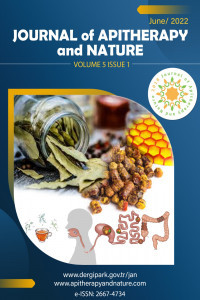A New Approach to Propolis Extraction
A New Approach to Propolis Extraction
Propolis Extraction, Total polyphenol content, Antioxidant capacity,
___
- .
- Yayın Aralığı: Yılda 2 Sayı
- Başlangıç: 2018
- Yayıncı: Oktay YILDIZ
Propolis from Romania and Turkey: Comparative Antioxidant and Antibacterial Activity
Otilia BOBIS, Merve KESKIN, Saban KESKIN, Sevgi KOLAYLI, Mihaela NICULAE, Adriana URCAN, Claudia PASCA, Liviu Al. MĂRGHITAS, Daniel S. DEZMIREAN
Antimicrobial Effect of Commercial Propolis Extract (BEEO©)
Aslı Elif TANUGUR, Sevgi KOLAYLI, Merve KESKIN, Sengul ALPAY KARAOGLU
İvan MISKULIN, İvana KLARIC, Matija DOMACINOVIC, Berislav PRAKATUR, Mirela PAVIC, Mario RONTA, Maja MISKULIN
Insights and Pitfalls in Propolis Research
Vassya BANKOVA, Milena POPOVA, Boryana TRUSHEVA
A New Approach to Propolis Extraction
Saban KESKIN, Merve KESKIN, Sevgi KOLAYLI
Soumaya TOUZANI, Sleman KADAN, Abdalsalam KMAIL, Bashar SAAD, Badiaa LYOUSSI
Intestinal Morphology Broiler Chickens Supplemented with Propolis
Maja MISKULIN, İvana KLARIC, Matija DOMACINOVIC, Berislav PRAKATUR, Mirela PAVIC, Nika PAVLOVIC, İvan MISKULIN
Effects of Propolis on the Quorum Sensing of Selected Biofilm Producing Bacterial Species
K. TENNICK, S. WAFA, H. FEARNLEY, M. GOMEZ ESCALADA
The Effects of Propolis on Growth Performance of Broiler Chickens
İvana KLARIC, Matija DOMACINOVIC, Berislav PRAKATUR, İvan MISKULIN, Bozica LACHNER, Dalida GALOVIC, Danijela SAMAC
Zaccaria VINCENZO, Galeotti FABIO, Fachini ALFREDO, Passarella PAOLO, Daglia MARIA, Volpi NICOLA
